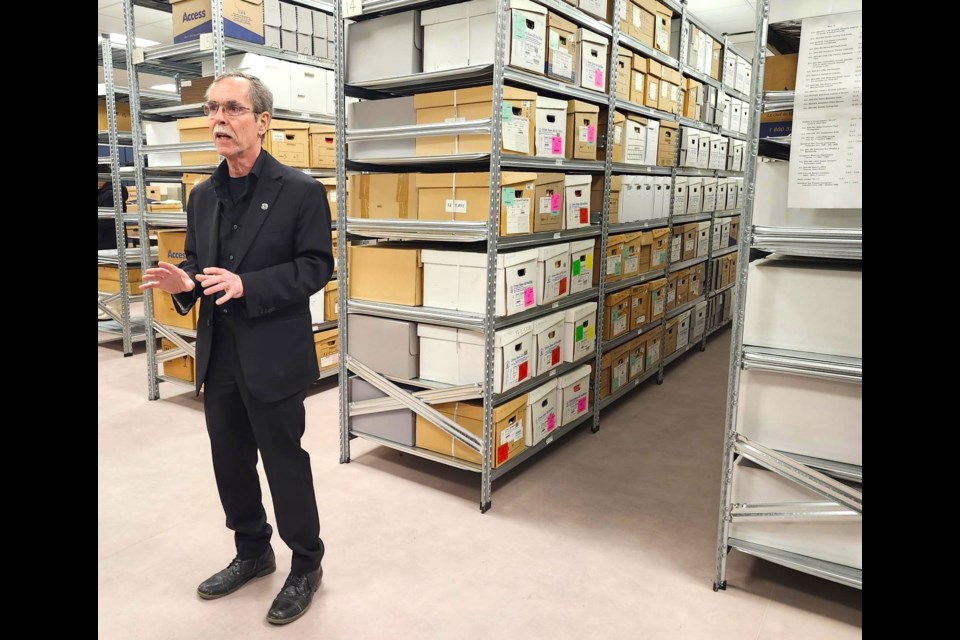SASKATOON — Protecting Saskatoon’s history and ensuring future generations learn about it is complex. However, Jeff O’Brien and his team are up to the task of carefully collecting and sorting every document that has become part of the historical fabric of the “Paris of the Prairies.”
“The idea of archives is to document the community so that you can look back and say: ‘This is what it was like to live in Saskatoon.’ This is what we were doing: preserving what happened,” O’Brien told 麻豆视频 during the grand opening of the new location of the City Archives on Tuesday night, Feb. 4.
“The problem with memory is that what we remember fades. And if you don't remember it, it didn't happen. Without memory, there's no history. Without physical evidence, it just doesn't exist. So, we want the people to remember.”
The City Archives’ permanent home is across Civic Square East on 4th Avenue North, behind Saskatoon City Hall. The then-City Council created the City Archives on Nov. 26, 1979, through a partnership with the Saskatchewan Provincial Archives. O'Brien is the fourth City Archivist. The first was Glenda Leslie in 1985, followed by Elizabeth Diamond and Eric Anderson.
In 1993, the City Archives got its space at the Arthur Cook building on 24th Street. After selling the building, they moved to a temporary space on Cardinal Crescent near the Saskatoon John G. Diefenbaker International Airport. Plans for the Archives to have their permanent location began in 1994 and came to fruition with Tuesday’s opening. The facility has a climate-controlled room to preserve delicate and old documents.
O’Brien is the city archivist, with Ken Dahl as his assistant. Together, they oversee the transfer of thousands of issues of the Saskatoon Star Phoenix from 1911 to 2022, more than 400,000 photos and films, documents, videos, newspaper microfilms, clippings, and other vital items that show how the city transformed from a community of over 100 people to a bustling and culturally diverse metropolis.
He added they also have collections of different individuals like local activist Don Kossick, who was involved in every left-wing campaign in Saskatchewan, and organizations like the Association of Canadian Travelers, the Saskatoon Boys Choir and the Saskatoon Nature Society.
O’Brien compared their job to that of a business's longest-serving employee or a corporate secretary who takes notes during meetings and keeps records of every decision made by the company's board of directors.
“I always say that the corporate memory is as old as the personal memory of the person who's been in the department the longest. So, nobody knows how a policy was developed because nobody here now was there when the policy was developed. Nobody was at the meeting. Nobody was taking the notes,” he said.
“You've got to be able to have that stuff in archives so you can say: ‘Why do we do this thing?’ And then we can say, okay, well, 1965 this thing happened. This is why we do that thing today. That's the importance of archives. They underpin and provide some background that lets us understand what's happening today.”
Mayor Cynthia Block, who attended the event with some members of the city council, told 麻豆视频 that the event, which coincides with Archives Week, said she’s excited to visit the City Archives for the first time as it now has a permanent place where the public can see and research Saskatoon’s history.
“It speaks to the generations of people who have helped build this city. The pieces that perhaps aren't always told will be housed here. The stories of the people that created history here even before Saskatoon became a city and how we're starting to understand why those stories matter today,” said Block, who was also part of Saskatoon’s history by becoming the city’s first female mayor.
“Our opportunity to learn hard truths, to acknowledge those hard truths, and to go forward and reconcile together, side by side, like the treaties intended. That gives us an amazing opportunity not just to reconcile that piece of our past but also all of the other voices that were not heard and not acknowledged in the history of our city and many other places worldwide. I'm speaking of people like newcomers, the LGBTQ community, people with disabilities, unhoused people.”
She added that the City Archives play an essential role in preserving historical events, good or bad, important people and their contributions, and other milestones from which we can learn and avoid repeating the unsavoury things that happened in the past.
“It's our opportunity to learn from the past. If we don't learn, we're probably destined to repeat things we don't want to. And if we do learn, we can stave off those things and create a city where all people thrive. The older I get, the more I understand how much history shapes our views. It shapes how we move forward. Understanding our past helps make us stronger going forward,” said Block.




